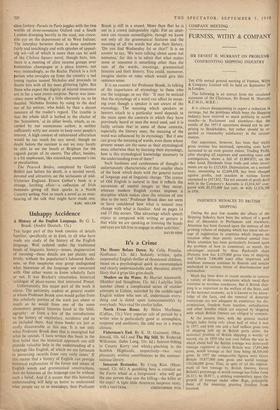Unhappy Accidence
THE larger part of this book consists of details familiar, specifically or in kind, to all who have made any study of the history of the English language. Well ordered under the traditional heads of linguistic history—tenses, degeneration of meaning—these details are put plainly and firmly, without the populariser's laboured flashi- ness, so that neophytes may grasp undisgusted what historians of the language are concerned with. One either wants to know scholarly facts or not. It was Brichot's remorseless historical catalogue of place-names that interested Proust.
Unfortunately this major pirt of the work is otiose. The university student or general reader at whom Professor Brook aims would gather from this scholarly portion of the work just about as much as he would from one of the more elementary general histories listed in the bibli- ography: or from a few• of the introductions to the history of vocabulary, accidence and so on included there. And those books are just as easily discoverable as this one. It is not only what Professor Brook does that is unoriginal but what he intends. 'I have written this book in the firm belief that the historical approach can still provide valuable help in the understanding of a language like English, of which we are fortunate in possessing records from very early times.' If this means that a history of English can provide historical explanation of the forms and senses of English words and grammatical constructions, then no historian of the language can be without such a belief. And if it means that this historical understanding will help us better to understand what people say to us nowadays, then Professor
Brook is still in a crowd. More than that he is not in i crowd indisputably right. For an utter- ance can remain unintelligible, though we know not only all the grammatical features and the meaning of all the words but also their history. `Do you find Wednesday fat or thin?' It is no answer to say, 'We were talking about sense not nonsense,' for this is to admit that what makes sense or nonsense is something other than the sum of the words,. meanings, grammatical features and their history. You could, moreover, imagine stories or roles which would give this sentence sense.
It is no counter for Professor Brook, in talking of the importance of etymology to those who use the language, to say this : 'It may be noticed that the etymology of a word can affect its mean- ing even though a speaker is not aware of the etymology. The meaning which speakers or hearers attach to a particular word depends in the main upon the contexts in which they have previously heard or seen the word used, and it is. fairly certain that in some of those contexts, especially the literary ones, the meaning of the word was influenced by its etymology.' But if one can grasp the meaning of words, even those whose present senses are the same as their etymological ones, otherwise than by learning their etymology, how is this etymological knowledge necessary to the understanding even of them?
Such hastiness and carelessness of thought is unfortunately characteristic of that smaller share of the book which deals with the general nature of language and of linguistic change. 'The syntax of Old English is natural in that it reflects the succession of mental images as they occur, whereas modern English syntax imposes a discipline which makes clear the relation of one idea to the next.' Professor Brook does not seem to have considered how what is natural may change with what is familiar. And on pages 14 and 15 this occurs. 'One advantage which speech enjoys as compared with writing or gesture is that while we are speaking or listening the hands and eyes are left free to engage in other activities.'
DAVID SIMS


































 Previous page
Previous page